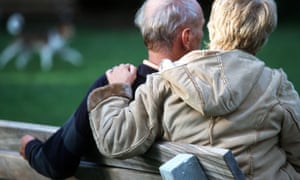
Being married boosts the survival chances of cancer patients, according to new research that analysed data from nearly 800,000 people. While the research backs up a number of studies that have previously highlighted the trend, the new study goes further, exploring the strength of the effect in patients of different race and ethnicity. The results reveal that the benefits of marriage appear to be greatest for non-Hispanic white men.
“We speculate that it has to do more with issues related to social support than economics,” said the lead author, Professor Maria Elena Martinez of the University of California, San Diego.
Writing in the journal Cancer, the authors report that they used figures from the California Cancer Registry to study data from 393,470 men and 389,697 women who had been diagnosed between 2000 and 2009 with one of 10 types of cancer that most commonly cause death in each sex across populations of different race and ethnicity. The researchers followed up on the patients until the end of 2012.
When adjusted for factors including insurance status and neighbourhood socioeconomic status, the results showed that, while marriage benefited both men and women, the size of the effect varied between the sexes and with race and ethnicity. The greatest effect was found for white patients who were not of Hispanic descent: bachelors had a 24% higher risk of dying than married men, while for women mortality was 17% higher for singletons.
With the number of unmarried adults on the rise, Martinez believes researchers now need to probe why marriage is beneficial – whether it is down to spouses taking patients to appointments, offering support for depression, reminding them to take their medication, or other effects. “We don’t have a handle [on] what it is in regard to social support that we need to go after to equalise everything, “ she said.
The study revealed another trend. For unmarried patients that identified as Asian Pacific Islanders (API) – a group that includes those of Japanese, Chinese and Indian descent – those born in the US had a worse chance of survival compared with married patients than those born elsewhere. The trend was also observed for women of Hispanic descent. Unmarried API men born in the US had a 21% higher risk of dying than those who were married, while for unmarried API men born outside the US, mortality was 9% higher than those who had wed. The authors believe the trend could be down to the immersion of patients in US culture. “It is plausible that social support outside marriage diminishes as individuals acculturate to the United States,” they write.
Martinez believes the study highlights the need for unmarried cancer patients to seek support from family and friends. Clinicians and healthcare providers, she added, should also take note. “We really want to highlight the awareness factor here that unmarried people perhaps could be considered a high-risk, vulnerable population,” said Martinez, who added that clinicians and healthcare providers should make efforts to ask questions of unmarried patients about their social support and consider referring them to support services.
But others believe further analysis is needed. As Dr Bernard Rachet from the the London School of Hygiene & Tropical Medicine points out, the study covers a period before the Affordable Care Act, known as “ObamaCare”, was introduced. What’s more, the research did not take into account whether patients married or divorced after their diagnosis, whether they were in relationships that did not involve marriage, or whether they had other diseases besides cancer.
Commenting on the research, Dr Alan Worsley, senior information officer atCancer Research UK, said: “While it’s unclear why married people in the study seemed to have better outcomes, it may in part be because partners can help to prompt their loved ones to go to the doctor early. So it’s important that single people make sure they go to the doctor soon if they develop a symptom they are concerned about.
“Doctors and nurses caring for single people with cancer should also take extra care in asking about their support networks and suggesting other avenues of support, like local groups. If anyone is unsure what to do, they can also ringCancer Research UK’s nurses to talk things through on freephone ![]() 0808 800 4040 FREE.”
0808 800 4040 FREE.”
[“source-ndtv”]
